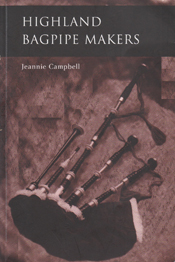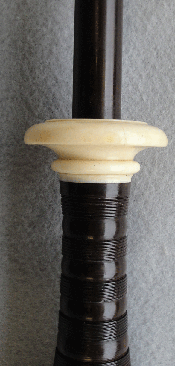Enjoying the pleasures of pipes past
Pleasing the market
Another hindrance to proper identification of pipes is the lack of knowledge of current owners about pipes. Many owners simply don’t know what they have and stick a name to a set for any number of reasons. Greed can also play a part in mis-identification. For example, Duncan MacDougall and some early Glen pipes can look very similar, but the MacDougall pipe will command a much higher price than the Glen. So if a seller possesses a set of pipes in this Edinburgh style and isn’t sure of the make, the sale will be more profitable if the pipes are simply called “MacDougall” rather than “Glen.” The reputation MacDougall pipes have in some circles for producing a subdued drone sound is not correct, and likely results from much quieter Glen pipes being passed off as MacDougalls by owners looking for a higher price or for the prestige of owning the more desirable MacDougall make.
Many vintage bagpipe owners who are quick to identify their pipes as one of the prime makers fail to account for the sheer number of pipe-makers who were in business during the 1800s and early 1900s. Jeannie Campbell’s invaluable 2001 publication Highland Bagpipe Makers has shed much light on this area in recent years. [Editor’s note: Campbell has since been made a Member of the British Empire for her service to piping.] During the time when the best known makers were operating during the mid- and late 1800s, there were more than 20 other companies and craftsmen making pipes, many of whom were quite obscure. Some of these makers were in business for 20 years or more and made no small number of instruments. So the margin of error for identifying bagpipes made during this period is large indeed.

Jeannie Campbell lists and offers descriptions of nearly 100 makers in her book. Some, like Henderson, Lawrie or, more recently, R. G. Hardie, made thousands of sets of pipes. The likes of James Robertson, David Glen and the various branches of the J & R Glen company, would have made slightly fewer. Duncan and Gavin MacDougall, John Center, Thow, Robert Gillanders, Alexander Glen and their ilk may have made fewer still, depending on the number of turners they employed.
But also at the level of these less prolific companies are superb names like William Ross, Donald MacPhee, William Gunn, Duncan MacRae, John Ban MacKenzie and Donald MacKay.
Leading pipe-makers
Who was the greatest pipe-maker? That is certainly open to debate. However, considering the number of premier players playing their instruments, and the number of high quality instruments still available today, it would be very reasonable to rank the early Peter Henderson company as the greatest pipe-making firm of all time.
Peter Henderson

Peter Henderson began operating around 1880, taking over the firm of the great piper, music compiler and pipemaker Donald MacPhee, who died that year at the tragically early age of 38. While Peter himself died in 1902, the great player and teacher John MacDougall Gillies managed pipemaking in the company from 1903 until his death in 1925. Without question, some of the pipes made during this era, especially those in ebony and cocuswood, are among the greatest instruments ever made. (When we are discussing the quality of a pipemaker’s instruments we are invariably discussing the drones, though Henderson also produced the best chanter for a time as well.) The high quality of Henderson pipes continued until the early 1950s, and it is generally agreed that the great age of Henderson pipes ended then.
Henderson pipes are characterized by a big, room-filling drone sound, a wide tuning range, and remarkable steadiness. The bass drone is often slightly flatter than other makes and tunes quite low on the tuning pin. It would be a sure bet to say that more major solo piping prizes have been won with old Peter Henderson drones than any other.

I’m surprised there are not a number of comments or questions on this article – a lot of information, experience and work in the article, much of which was new to me. So glad the article was retrieved!